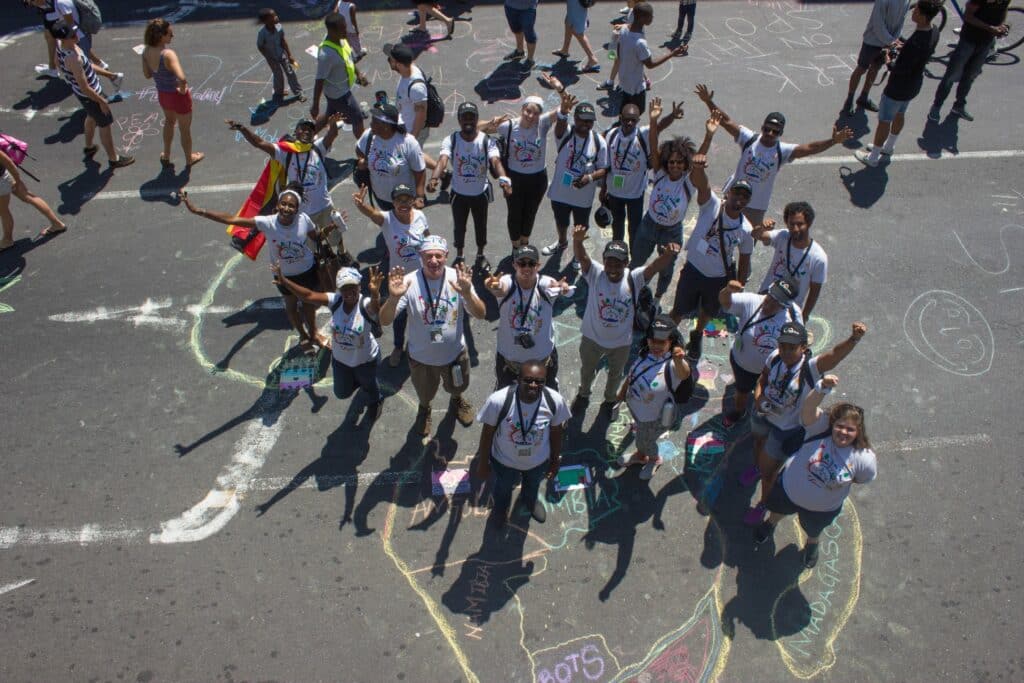
GIZ is currently running a call for a first “Rethinking Transport Lab”, an exciting initiative designed to promote creativity, innovation and collaboration between transport stakeholders in Africa. These Labs, along with other related activities under the Rethinking Transport initiative, represents a new approach for GIZ, focusing on strengthening personal and professional networks rather than just institutional capacity building. Discover how networking could serve as a driving force for progress in Africa’s transport sector.
Africa’s development needs are becoming more urgent owing to the effects of climate change, rapid population growth and lifestyle changes. These factors are placing heightened financial demands on the continent, exacerbating the challenges faced by African nations that are still in the process of recovering from the recent global pandemic. While aid continues to play a crucial role in building capacity, leveraging resources, and achieving targeted outcomes, it is evident that African leaders must explore alternative approaches to traditional development strategies. This includes engaging actively with private sector investments, promoting domestic resource mobilization, as well as exploring debt relief and restructuring options. These strategies, in conjunction with robust partnerships and collaborations, will be vital in leveraging resources, sharing knowledge, and implementing effective solutions to meet the increasing financial demands and drive progress across the continent.
Transport plays a vital role in driving economic growth, facilitating trade, and fostering community connections. However, it is a key contributor to raising CO2 emissions: 29 % of total CO2 emissions from the combustion of coal, crude oil, and natural gas are attributable to the transport sector, and most of that comes from road vehicles[i]. Although Africa’s contribution is smaller, emission trends on the continent call for immediate action. Greening the sector will therefore play a significant role in combating climate change and boosting Africa’s development [ii].
The influential Kofi Annan emphasizes that “partnerships can lead to sustainable structural change” on the continent. As such partnerships often emerge from networking, it is crucial to explore the immense potential that networking among African transport practitioners and organizations could offer to revolutionize and greening the transport and mobility sector in Africa.
Scientific evidence and principles firmly support the potential benefits of networking among individuals and organizations. The field of social network analysis offers a comprehensive framework for understanding how relationships and interactions between entities can foster innovation, knowledge sharing, and collaborative problem-solving.
Numerous challenges, including inadequate infrastructure, limited access to transport services, and inefficient systems, hinder progress in the transport sector[iiiii], which is vital fro Africa’s economic and social development. For instance, studies have shown that poor road, rail and port facilities add 30% to 40% to the costs of goods traded among African countries, thus adversely affecting the private sector development and the flow of foreign direct investment (FDI).
Furthermore, traffic congestion is a prevalent issue in many African cities, hampering economic productivity, causing tremendous air pollution and increasing greenhouse gas emissions. Networking among African transport practitioners could offer a promising avenue to overcome these obstacles and unlock the full potential of Africa’s transport and mobility landscape.
To maximize the impact of networking in the transport sector, it is essential to establish synergies with donor activities. This linkage can forge a mutually beneficial relationship, leading to enhanced impact and effectiveness in addressing the transport sector’s challenges. Donors have long played a crucial role in providing financial support, technical expertise, and policy guidance to advance development goals in Africa.
For instance, the Rethinking Transport in Africa project actively supports the development of positions and strategies for the sustainable transformation of the transport sector on the African continent. The project aims to bring together stakeholders from academia, civil society, and the private sector, to foster an inclusive and collaborative environment for knowledge sharing and networking. Such initiatives therefore contribute to aligning efforts, pooling resources, and leveraging expertise to address the challenges faced by the transport sector. Here are some key approaches to integrating networking with donor initiatives:
In a nutshell, networking appears to be an essential tool for reshaping Africa’s transport sector, unlocking new opportunities, driving innovation, and paving the way for sustainable and inclusive mobility. Financial support will be vital in harnessing its full potential, with initiatives that facilitate collaboration, resource mobilization, and knowledge exchange. As we move forward, it is imperative to prioritize funding mechanisms that incentivize collaboration, support knowledge exchange, and enhance capacity building.
Let’s embrace the power of networking, cultivate strong partnerships, and work collectively to build a transport ecosystem that serves the needs of the people, fosters economic growth, and enhances the quality of life for all Africans.
Daniel Bongardt
Interested to become part of a network of African transport practitioners to engage in the sustainable future of transport across the continent? Check out the Rethinking Transport Labs, that aim to bring together 30 African practitioners to exchange and connect about key topics for sustainable transport. If you are looking for like-minded people, this LinkedIn Group provides opportunities to get in touch online with practitioners from across Africa.
[i] Granovetter M. (1973). The strength of weak ties. American Journal of Sociology, 78(6), 1360–1380. https://doi.org/10.1086/225469
[ii] Agora Verkehrswende and GIZ (2023): Leapfrogging to Sustainable Transport in Africa. Twelve Insights into the Continent’s Sector Transformation.
[iii] Burt RS (2004) Structural holes and good ideas. Am J Sociol. https://doi.org/10.1086/421787
[iiii] Uzzi B, Spiro J (2005) Collaboration and creativity: the small world problem. Am J Sociol 111(2):447–504
[iiiii] World Bank. (2020). Africa’s Pulse, No. 21: An Analysis of Issues Shaping Africa’s Economic Future. http://hdl.handle.net/10986/33541 License: CC BY 3.0 IGO
The “Rethinking Transport – Connecting for African Solutions” project is funded the Deutsche Gesellschaft für Internationale Zusammenarbeit (GIZ) GmbH own ressources. The project is implemented by GIZ in cooperation with the German think tank Agora Verkehrswende.